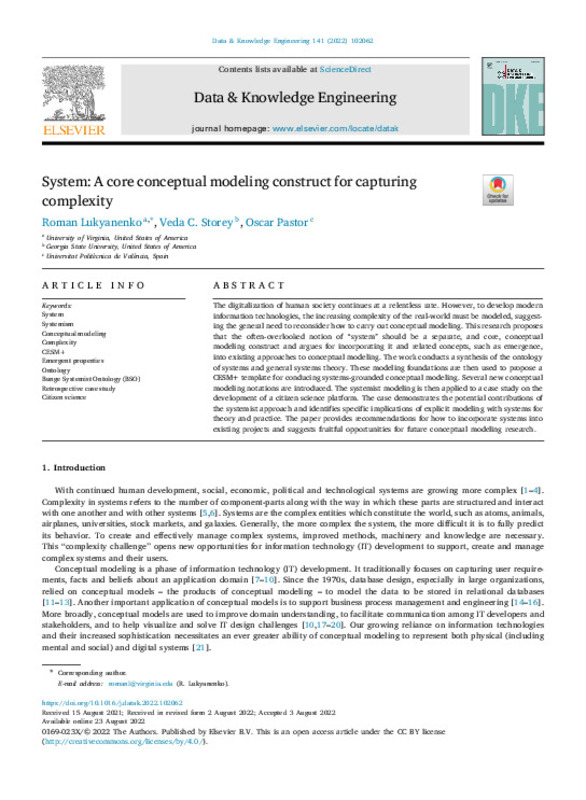JavaScript is disabled for your browser. Some features of this site may not work without it.
Buscar en RiuNet
Listar
Mi cuenta
Estadísticas
Ayuda RiuNet
Admin. UPV
System: A core conceptual modeling construct for capturing complexity
Mostrar el registro sencillo del ítem
Ficheros en el ítem
| dc.contributor.author | Lukyanenko, Roman
|
es_ES |
| dc.contributor.author | Storey, Veda C.
|
es_ES |
| dc.contributor.author | Pastor López, Oscar
|
es_ES |
| dc.date.accessioned | 2023-05-15T18:02:14Z | |
| dc.date.available | 2023-05-15T18:02:14Z | |
| dc.date.issued | 2022-09 | es_ES |
| dc.identifier.issn | 0169-023X | es_ES |
| dc.identifier.uri | http://hdl.handle.net/10251/193400 | |
| dc.description.abstract | [EN] The digitalization of human society continues at a relentless rate. However, to develop modern information technologies, the increasing complexity of the real-world must be modeled, suggest-ing the general need to reconsider how to carry out conceptual modeling. This research proposes that the often-overlooked notion of "system"should be a separate, and core, conceptual modeling construct and argues for incorporating it and related concepts, such as emergence, into existing approaches to conceptual modeling. The work conducts a synthesis of the ontology of systems and general systems theory. These modeling foundations are then used to propose a CESM+ template for conducing systems-grounded conceptual modeling. Several new conceptual modeling notations are introduced. The systemist modeling is then applied to a case study on the development of a citizen science platform. The case demonstrates the potential contributions of the systemist approach and identifies specific implications of explicit modeling with systems for theory and practice. The paper provides recommendations for how to incorporate systems into existing projects and suggests fruitful opportunities for future conceptual modeling research. | es_ES |
| dc.description.sponsorship | We wish to thank the editor-in-chief, Carson Woo, and three anonymous reviewers for their exceptionally insightful and developmental comments. The substantial improvements that resulted from their feedback were much deeper than we usually experience in journal review processes. We wish to thank the participants of www.nlnature.com (now inactive) who contributed their sightings from 2010 to 2022. We also thank Jeffrey Parsons and Yolanda Wiersma - the co -investigators of NLNature. We are grateful to the late Mario Bunge and to Ron Weber with whom we discussed ontological ideas that inspired this paper. We also want to thank the participants and reviewers of AIS SIGSAND and ER Conference for their comments and feedback on earlier versions of this paper. This research was supported by McIntire School of Commerce, University of Virginia, J. Mack Robinson College of Business, Georgia State University, United States, and by VRAIN Research Institute of the Universitat Politecnica de Valencia and the Generalitat Valenciana, Spain under the CoMoDiD project (CIPROM/2021/023) . | es_ES |
| dc.language | Inglés | es_ES |
| dc.publisher | Elsevier | es_ES |
| dc.relation.ispartof | Data & Knowledge Engineering | es_ES |
| dc.rights | Reconocimiento (by) | es_ES |
| dc.subject | System | es_ES |
| dc.subject | Systemism | es_ES |
| dc.subject | Conceptual modeling | es_ES |
| dc.subject | Complexity | es_ES |
| dc.subject | CESM plus | es_ES |
| dc.subject | Emergent properties | es_ES |
| dc.subject | Ontology | es_ES |
| dc.subject | Bunge Systemist Ontology (BSO) | es_ES |
| dc.subject | Retrospective case study | es_ES |
| dc.subject | Citizen science | es_ES |
| dc.subject.classification | LENGUAJES Y SISTEMAS INFORMATICOS | es_ES |
| dc.title | System: A core conceptual modeling construct for capturing complexity | es_ES |
| dc.type | Artículo | es_ES |
| dc.identifier.doi | 10.1016/j.datak.2022.102062 | es_ES |
| dc.relation.projectID | info:eu-repo/grantAgreement/GVA//CIPROM%2F2021%2F023/ | es_ES |
| dc.rights.accessRights | Abierto | es_ES |
| dc.contributor.affiliation | Universitat Politècnica de València. Escola Tècnica Superior d'Enginyeria Informàtica | es_ES |
| dc.description.bibliographicCitation | Lukyanenko, R.; Storey, VC.; Pastor López, O. (2022). System: A core conceptual modeling construct for capturing complexity. Data & Knowledge Engineering. 141:1-29. https://doi.org/10.1016/j.datak.2022.102062 | es_ES |
| dc.description.accrualMethod | S | es_ES |
| dc.relation.publisherversion | https://doi.org/10.1016/j.datak.2022.102062 | es_ES |
| dc.description.upvformatpinicio | 1 | es_ES |
| dc.description.upvformatpfin | 29 | es_ES |
| dc.type.version | info:eu-repo/semantics/publishedVersion | es_ES |
| dc.description.volume | 141 | es_ES |
| dc.relation.pasarela | S\491537 | es_ES |
| dc.contributor.funder | Generalitat Valenciana | es_ES |
| dc.contributor.funder | University of Virginia | es_ES |
| dc.contributor.funder | Georgia State University | es_ES |
| dc.contributor.funder | Instituto Valenciano de Investigación en Inteligencia Artificial | es_ES |
| dc.contributor.funder | Universitat Politècnica de València | es_ES |








